- Theorem:
- Let
T1,
T2, ...
Tn be
n transactions that
obey the
2PL rule:
- T1, T2, ... Tn do not execute any unlock operation before a lock operation
- Let Sn = a
schedule of the
(read, write, lock and unlock) operations
found in
T1,
T2, ...
Tn
(that obey the
locking semantics !!!)
- Then:
- Sn is a conflict-serializable schedule
- Let
T1,
T2, ...
Tn be
n transactions that
obey the
2PL rule:
- Proof: by induction
- The base case:
n = 1
- T1 is
1 transaction that
obey the
2PL rule
- S1 = a
schedule of the
(read, write, lock and unlock) operations
found in
T1
- Then:
- S1 is
serial schedule
- Therefore, S1 is trivially a conflict-serializable schedule
- S1 is
serial schedule
- T1 is
1 transaction that
obey the
2PL rule
- The induction case:
- Induction asumption:
- Every schedule Sn−1 of the (read, write, lock and unlock) operations found in n−1 transactions T1, T2, ... Tn−1 (that obey the locking semantics !!!) is conflict-serializable
- Let Sn = a
schedule of the
(read, write, lock and unlock) operations
found in n transactions
T1,
T2, ...
Tn
(that obey the
locking semantics !!!)
- We must show that Sn is a conflict-serializable schedule
- Let
ui(•)
be the
first unlock operation
found in
schedule Sn:

Claim:
- We can move
all
the operations
ri(•) and wi(•)
of the
transaction Ti
forward in
schedule Sn
without passing
any
conflicting operation by
another transaction
Graphically:
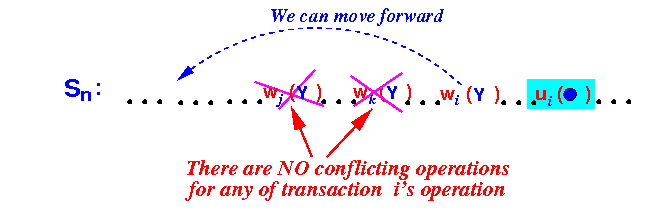
In other words:
- Every operation that preceeds an operation X of transaction Ti do not conflict the operation X
- We can move
all
the operations
ri(•) and wi(•)
of the
transaction Ti
forward in
schedule Sn
without passing
any
conflicting operation by
another transaction
- Proof
of the claim:
- Consider an
aribitrary operation
by transaction Ti: e.g.,
wi(Y)

- Consider an
arbitrary
conflicting operation
of a transaction
Tj: e.g.,
wj(Y)
that
preceeds
wi(Y):

We will prove that this ordering of operations is not possible
I.e.:
- This ordering will result in an absurd result (= contradictory result)
- In order for this ordering to be
legal
(= obeying
the 2-phase locking rules),
we must have
the following lock/unlock sequence on the
DB element Y:

- Since transaction Ti
is
2 Phased locking, the
first unlock operation
ui(•) must
follow
every
lock operations
In particular, the first unlock operation ui(X) of transaction Ti must follow ℓi(Y):
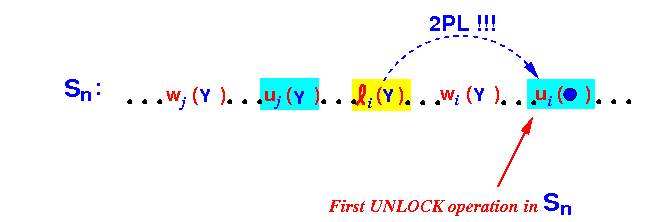
That means, in schedule Sn:
- The
transaction j performed
an
unlock operation
before
the first unlock operation
ui(•) in
the schedule Sn:
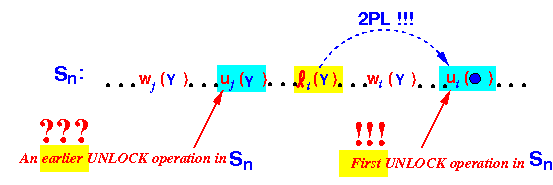
Conclussion:
- There is an unlock operation before the first unlock operation ui(•) !!!
This is a contradiction of the fact that ui(•) is first unlock operation in the schedule Sn !!
- The
transaction j performed
an
unlock operation
before
the first unlock operation
ui(•) in
the schedule Sn:
So this claim is true:
- Every operation that preceeds an operation X of transaction Ti do not conflict the operation X
Therefore:
- We can move
all
the operations
ri(•) and wi(•)
by
transaction Ti
forward in
schedule Sn
without passing
any
conflicting operation by
other transactions:

- Consider an
aribitrary operation
by transaction Ti: e.g.,
wi(Y)
- After moving
all operations of
transaction Ti forward,
we obtain the following
schedule S'n that
is conflict-equivalent to
the original schedule Sn:

Schedule S'n consists of:
- All operations by
transaction Ti
(= the first transaction that performs an
unlock operation)
is at the front
- Followed by a (sub-)schedule S''n−1 for (n−1) (2-phased-locking) transactions
By the induction asumption that says:
- Every schedule Sn−1 of n−1 transactions T1, T2, ... Tn−1 that obey the 2-phased locking semantics is conflict-serializable
We conclude that the schedule S''n−1 (of (n−1) transactions) is conflict-serializable:
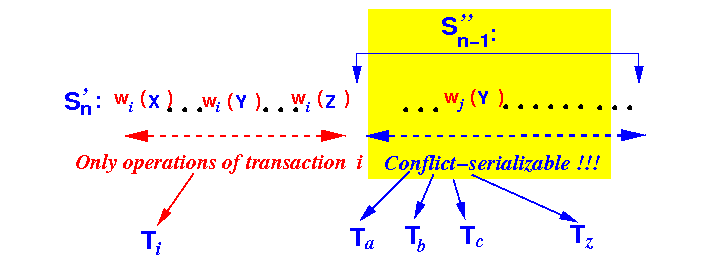
In other words:
- The schedule S'n is
conflict-equivalent to
a schedule consisting of:
- Ti followed by
- A serial schedule of (n-1) transactions
I.e.: schedule S'n is conflict-serializable
Since Sn is conflict-equivalent to S'n:
- The schedule Sn
is
conflict-serializable:
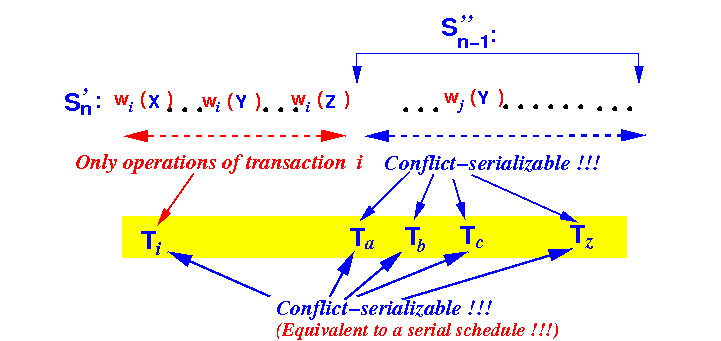
Q.E.D.
- All operations by
transaction Ti
(= the first transaction that performs an
unlock operation)
is at the front
- Induction asumption: